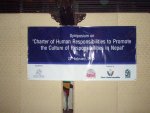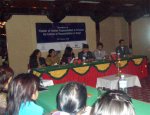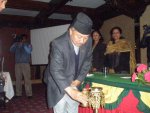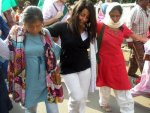
Publicado em 7 de maio de 2010
Traduções disponíveis em:
Symposium on "CHR to Promote the Culture of Responsibilities in Nepal"
por Sudha REDDY
Temas fortes ligados:
Cultura de responsabilidade .
Temas largos ligados:
Enterprises .
Human Rights .
Mídia .
Political responsibility .
Women .
Symposium on "Charter of Human Responsibilities
to Promote the Culture of Responsibilities in Nepal"
Kathmandu, Nepal on 23rd February 2010
A symposium was organized at Kathmandu, Nepal on 23rd February 2010 by Rahat- Nepal in collaboration with CHR and Sahajeevan- India in order to launch and promote CHR in Nepal. And in response to the call for corporate social responsibility, logistics was partly supported by Surya Nepal a major corporate house in Nepal. Approximately fifty plus distinguished participants form Political, Government, Non government, Development, Academic, Media, Corporate and Legal sectors actively participated in the program. Basically there were two sessions: Inaugural session and working session. The program started at 8.30 am and concluded at 5.00 pm. Ms. Sudha Sreenivasa Reddy, Asia Coordinator for CHR also actively participated the symposium by introducing and sharing her views on CHR and presenting a paper in the event.
In fact, the symposium has proved very productive especially because of the meaningful outputs. It succeeded to draw the attention, commitment and views of top level personals/state actors and key stakeholders. Moreover it has been able to add a mile-stone in its way ahead to setup the CHR and promote the culture of Responsibilities in Nepal.
Inaugural Session:
Honorable chairperson of Constituent Assembly Mr. Subhash Chandra Neawang kindly consented to be the Chief Guest of the program. He inaugurated the event by lighting the traditional Nepalese lamp Panas. Rt .honorable chairperson and chief guest of the program Mr. Nemwang highlighted the relevancy of CHR in Nepal at current scenario. He congratulated and thanked Rahat for its thoughtful and meaningful initiatives and commitment towards the setting up of CHR in the country. He expressed his hope that CHR will be not confined as an important agenda only but Rahat will extend and continue its untiring endevour to carryout and adopt it in the form of culture, practicing it from grass root to policy level in their concerned areas.
Another key speaker of the program, Prof. Dr. Pushkar Bajrachary, Honorable member of National Planning Commission stated that disparities and misbalance of Rights and Responsibilities especially in the developing society or state can be found in wider gap due to the slackness in implementation of law / order and other socioeconomic and development backwardness. Furthermore, he added the ignorant, illiterate and the people living in extreme poverty obviously may not be very much aware on the balance of Rights and Responsibilities and this gap may be wider in underdeveloped society and country which need to be narrowed down uplifting the people’s level of awareness and promoting the developmental facilities as well. Definitely, big power brings big responsibilities with it. He presented a couple of examples with sharp realities. He emphasized, now the time has come to be responsible not only towards the human kind but even towards the nature itself. Since, the irresponsible and heavy exploitation of natural components may challenge or already challenged the humanity at present and in worst form in future. So, responsibilities are very deep concerns for both human and non human living form and nature itself.
While introducing CHR, its background and the commitment of FPH in the symposium, the Asia coordinator of CHR Sudha Reddy spoke on the need for culture of responsibility, relevance of CHR in South Asia and in countries like India and Nepal. She illustrated how the culture of the responsibility in any sector can prove an effective tool or ethical framework to manage the present chaotic situation of South Asia and the world itself. Finally she proposed the idea of Universal Declaration of Universal Responsibilities as unique complimentary to Universal Declaration of Human Rights.
Prof. Dr. Madhavi Singh President of Rahat and also the chair person of the Symposium briefed the present transitional scenario of Nepal and expressed her deep concerns and anxiety on behalf of Rahat and in her own as citizen of Nepal on the degraded situation of law and order, social security, economy and the whole development process it self in her Welcome and Program- Highlights speech.
Moreover, she illustrated, although, People’s ardent desire for Democracy and sincere endevour to achieve it contributed to, bring drastic political changes within the country, enabling people sovereign to exercise their civil rights, but creating serious threats for peace and security challenging the peaceful, secured lives. It totally failed to deliver in the development of socio- economic sector. However, these historic achievements and changes have failed to meet the people’s expectation or desire for peace and prosperity.
She added corporate security has been threatened violently and not only the public private investments and corporate enhancement have been set back, even the existence does not seem viable. Actually, rights and responsibility ‘coincide’, they are complimentary to each other. Rights get perfection if used with Responsibilities, she added.
Finally Dr. Madhavi Singh urged to proceed towards Responsibilities, together, to make this world a better place to live in. A violence free world …a Responsible world….a perfect world …
Mr. Ravi K.C. Senior General Manager of Surya Nepal congratulated Rahat for its timely initiation on CHR, and he shared that investment or corporate friendly environment is must for the over all development of a country. So, he stressed for the concerned stake’s responsibilities to preserve corporate security and create a conducive environment for the growth of both public private investments.
At, the end of Inaugural Session Dr. Chapala Koirala Vice president of Rahat, shared a brief introduction of Rahat. What it has accomplished and where it is heading to; Moreover, She briefed, Rahat has been working in socio economic development sectors. Its main thrust has been seeking the concerns and commitment from social-political authorities as well as from the governance and other Key Stake holders towards their responsibilities for the society and nation at large. Rahat has been advocating for the rights of the deprived women group with developing a sense of responsibilities towards their family, society and nation. In this connection, she recalled Rahat organized a consensus building workshop of Security Forces / Nepal Police, to bring into light the degraded situation of security in the country. Similarly, it developed a "Code of Ethics" to safeguard the professional interest of female employees of cabin restaurants, which was submitted to Ministry of Women Children and Social Welfare, on November 2006, later on, the ministry formed a committee under the chairmanship of the secretary of the ministry, which consisted of major stake holders to look into the issue. Rahat was also appointed as an active member of the committee. With the consultation of its members, the revised version of the “Code of Ethics” was forwarded to the Supreme Court. The Verdict and Procedural Guidelines was issued by the Supreme Court for the Prevention of Sexual Harassment against Working Women at Workplaces like Cabin / Dance Restaurants on 2065/8/13 B.S. which has clearly spelled out and managed for the provision of "District Monitoring and Action Committee".
With this, she expressed, her sincere gratitude to the Rt. Hon. chief guest Mr Subash Chadra Nemwang for his gracious presence on the event, Hon. member of National Planning Commission, Prof. Pushker Bajracharya, Ms. Sudha Reddy for her deep concern in opening a chapter on Charter of Human Responsibilities in Nepal, Honorable Members of Parliament, Senior Politicians. She added her indebtedness to Surya Nepal for its interest to support this program with the realization of corporate responsibilities to the important issue. Finally, She extended her heart felt thanks to the august participants and the Resource Persons from various sectors, who shared their valuable experiences to make the event highly successful and result oriented.
Working Session:
Altogether, four different dimension’s commendable papers were presented in the working session followed by question / answer duration after each presentation.
Dr. Narayan Khadka, member of parliament, Nepali Congress shared on culture of responsible politics. He stated that, the creation of a peaceful, harmoniously co existing, an equitable and just world with humanity , respect for human rights, cultural diversity and culture of fairness is in the best interest of all people across the world. The planet cannot remain divided for too long between the very rich and the very poor, between conflict ridden and the stable worlds, neither can it sustain for long without collectively caring for the deteriorating environment. Politics is key to addressing most of the social, political, cultural and environmental ills humanity is facing today. We must understand that local, national and global politics cannot remain separated from the moral and legal responsibility towards the people it serves. Hence, politics must be loaded with two basic values, the culture of responsibility and the respect for human rights. These values must be accepted as universally accepted and applied principles.
Mr. Shyam Sunder Sharma, Joint Secretary of Election Commission of Nepal and core group member presented a paper on “Socio-cultural and Economic Agenda”. He highlighted that Nepal as a transitional society after a decade of armed conflict issues on rights and responsibilities are being very prominent and significant. The paper emphasized on the need of change on the Nepali tendency to seek only rights and not sensitive to responsibilities. Rights and responsibilities are two aspects of a coin and “no responsibility no rights” culture must be promoted in Nepali society.
Women and minority ethnic groups are lagging behind in socio-cultural and economic arena of the society. Every aspect of society and state must be sensitized on the sense of responsibilities to serve the weaker section of women and ethnic minority. The paper also emphasized on the corporate responsibilities to address the issues on gender and ethnical groups. Being a socially and economically growing sector of the society corporate sector should take responsibilities to take care of the issues amicably and responsibly.
The presentation was focused on Rights and responsibilities in Nepali context, socio-cultural and economic agenda regarding gender and ethnic issues, social mosaic of Nepal, gender and ethnic issues in governance and state management, poverty incidence, corporate responsibilities. The paper also raised the issues that there is general tendency of not respecting others rights, due to weak ‘rule of law’ system and law enforcement system people feel unsecured to use their fundamental rights, public management is not adequately accountable and responsible on governance and service delivery, lack of adequate awareness on human rights and responsibilities in general public.
Talking about the strategies to address the issues the paper emphasized that the Nepal society should be transformed as discriminatory culture to non-discriminatory, feudal to democratic, integration of diverse culture with respectable identity of all culture, gender and ethical issues to development and prosperity issue.
Participants were very eager to know the consolidation and matching of the charter and the social issues. They have queries on how CHR can accommodate or address the social issues like in Nepal. Mr. Sharma addressed the queries during and after his presentation.
Mr. Arjun Narshing K.C. senior leader and spokesperson, of Nepali Congress pointed out the strong relevancy of culture of responsibilities, which can come up as a rescue rope at this national juncture, not only to civilians and the bearcats but to the political parties and to the top level authorities of this country as well. More over, he congratulated and appreciated Rahat picking up such a crucial and need based concerns. He also expressed his best wishes to Rahat for this very meaningful and challenging journey ahead to create and promote the culture of responsibilities in Nepal.
Mr. Kamal Paudel, subeditor of National Daily, on his paper ’ Role of Media in Human Responsibilities" highlighted:Media can contribute a lot to a society. It can influence opinions because of its accessibility towards people and society at large. This strength can either be used constructively by educating the people or it can be used destructively by misleading the innocent people. In larger social system media is regarded as social sub system. No doubt, media is powerful instrument for social change.
Media personals have access to people and they have audiences. Their programs have an impact and people listen to them. That’s why they are more responsible for the betterment of the society. They should work to educate the people, to help the people, to liberate the people and to mobilize the people as well as they make people responsible.
Media plays a vital role in the building of the society. Media are the source of information or communication. Media includes like print media, electronic media and new media (email-internet). In this age when there are so many TV channels obviously, media have a lot of responsibilities, since it has power to influence the society all over the world.
In the past when the media was not so strong we were quite ignorant about what is happening around us. But today we come to know very quickly what is happening around us. We have the access to all the international news channels that provide us the facts and figures.
Access to information is essential to the health of democracy for at least two reasons. First, it ensures that citizens make responsible, informed choices rather than acting out of ignorance or misinformation. Second, information serves a "surveillance function” by ensuring that elected representatives uphold their oaths and carry out the wishes of those who elected them. In some societies the role of the press to disseminate information as a way of mediating between the state and all surface of civil society remain critical.
Most notably, Article 19 of the 1948 Universal Declaration of Human Rights states, “Everyone has the right to freedom of opinion and expression; this right includes freedom to hold opinions without interference and to seek, receive, and impart information and ideas through any media and regardless of frontiers.
In modern society media has become a part and parcel of life. Its duty is to inform, educate and entertain. It is considered as the 4th estate of a nation. They put their lives in danger during armed conflict or natural disaster just to inform us about it. Media is a bridge between the governing bodies and general public. It is a powerful and flexible tool that influences the public to a great extent. Media is considered as voice of the voiceless. Media should play more constructive role, to empower people with rights and responsibilities, by being vigilant as well as by giving alternative views that can lead to the peace and happiness.
Finally, Ms. Sudha Reddy Asia Coordinator for CHR gave a brief review on Socio-Economic political and cultural issues from Responsibility prospective, with clear highlights on need of responsible thoughts and actions to address the present emerging issues challenging the humanity and human rights. She elaborated basic meaning of Responsibility in order to clarify the concept in the context of Rights approach. Rights flow from the understanding of responsibility.
At the end of the presentations and discussions three prime agendas were identified and raised for discussion, group work and action strategy to implement CHR in Nepal.
![]() Develop strategy to make Politics and Judiciary Responsible:
Develop strategy to make Politics and Judiciary Responsible:
Suggested to design and deliver different level of awareness, advocacy and other programs to sensitize, pressure and extend various approaches to political parties, leaders, Bureaucrats, policy makers and planners, judiciary and civilians as a whole.
![]() Develop framework to address gender ethnic and corporate issues:
Develop framework to address gender ethnic and corporate issues:
Formation of pressure group to maintain and preserve the gender, ethnic and corporate issues in right track. Developing and executing the policies for the concerned stakes to make accountable and responsible towards the target population and their issues.
![]() Develop Strategy to strengthen Media Partnership to Promote CHR in Nepal:
Develop Strategy to strengthen Media Partnership to Promote CHR in Nepal:
Endeavor to make the Media professional, unbiased and transparent. Launching of campaign and movement on CHR through the various mechanism of Media.
During, the concluding remarks of the program, Dr. Madhavi Singh from the chair, expressed satisfaction for the commitments of the concerned stakes towards their roles and responsibilities. Furthermore, she emphasized that in democracy everyone have rights, but to exercise rights without violating other’s right is the responsibility of every right user, which is the rule of the game. Obviously, to be responsible is to value other’s rights, so this culture needs to be institutionalized for peace prosperity and development.
She assured, Rahat will proceed forward towards this direction with its strong stand and commitments. It will be given untiring momentum, bringing into light specific programs to create, promote and institutionalize the culture of responsibilities in days to come.
She also mentioned briefly about Rahat’s future Road Map in the way ahead to promote CHR. Awareness, Training and Integration with the programs and policies, Interactions , Advocacy, Set up the public forum for the continuity of the CHR, publications and documentations as well as the coordination with the concerned stakes to institutionalize the CHR in documented policies and format, have been identified as a basic tools to promote the culture of CHR in Nepal.
Major outcome of the symposium:
Some of the high level political leaders and bureaucrats have suggested Rahat to take this initiative forward at all levels including the drafting committee of the Constitution.









